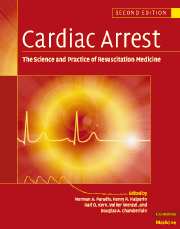Book contents
- Frontmatter
- Contents
- List of contributors
- Foreword
- Preface
- Part I Introduction
- Part II Basic science
- Part III The pathophysiology of global ischemia and reperfusion
- Part IV Therapy of sudden death
- Part V Postresuscitation disease and its care
- Part VI Special resuscitation circumstances
- Part VII Special issues in resuscitation
- 66 The ethics of resuscitation and end of life decisions
- 67 The economics of treating sudden cardiac arrest
- 68 Medicolegal aspects
- 69 The near-death experience, long-term psychological outcomes and support of survivors
- 70 CPR training
- 71 Consensus development in resuscitation: the growing movement towards international emergency cardiovascular care guidelines
- Index
66 - The ethics of resuscitation and end of life decisions
from Part VII - Special issues in resuscitation
Published online by Cambridge University Press: 06 January 2010
- Frontmatter
- Contents
- List of contributors
- Foreword
- Preface
- Part I Introduction
- Part II Basic science
- Part III The pathophysiology of global ischemia and reperfusion
- Part IV Therapy of sudden death
- Part V Postresuscitation disease and its care
- Part VI Special resuscitation circumstances
- Part VII Special issues in resuscitation
- 66 The ethics of resuscitation and end of life decisions
- 67 The economics of treating sudden cardiac arrest
- 68 Medicolegal aspects
- 69 The near-death experience, long-term psychological outcomes and support of survivors
- 70 CPR training
- 71 Consensus development in resuscitation: the growing movement towards international emergency cardiovascular care guidelines
- Index
Summary
Introduction
Successful resuscitation attempts have brought extended, useful, and precious life to many, and happiness and relief to their relatives and loved ones. And yet there are occasions when resuscitation attempts have merely prolonged suffering and the process of dying. In a few cases, resuscitation has resulted in the ultimate tragedy – the patient in a persistent vegetative state. It is to be remembered that resuscitation attempts are unsuccessful in 70%–95% of cases and death ultimately is inevitable. All would wish to die with dignity.
A number of ethical decisions are required to ensure that the decisions to attempt or withhold resuscitation are appropriate and the patients and their loved ones are treated with dignity. These decisions may be influenced by individual, international, and local cultural, legal, traditional, religious, social and economic factors. Sometimes the decisions can be made in advance, but often they have to be made in a matter of seconds at the time of the emergency. Therefore, it is important that healthcare providers understand the principles involved before they are put in a situation where a resuscitation decision must be made.
This chapter will deal with the following ethical aspects and decisions:
Advance directives, sometimes known as Living Wills
When not to start resuscitation attempts
When to stop resuscitation attempts
Decision making by non-physicians
When to withdraw treatment in those in a persistent vegetative state following resuscitation
Decisions regarding active euthanasia
[…]
- Type
- Chapter
- Information
- Cardiac ArrestThe Science and Practice of Resuscitation Medicine, pp. 1201 - 1211Publisher: Cambridge University PressPrint publication year: 2007



